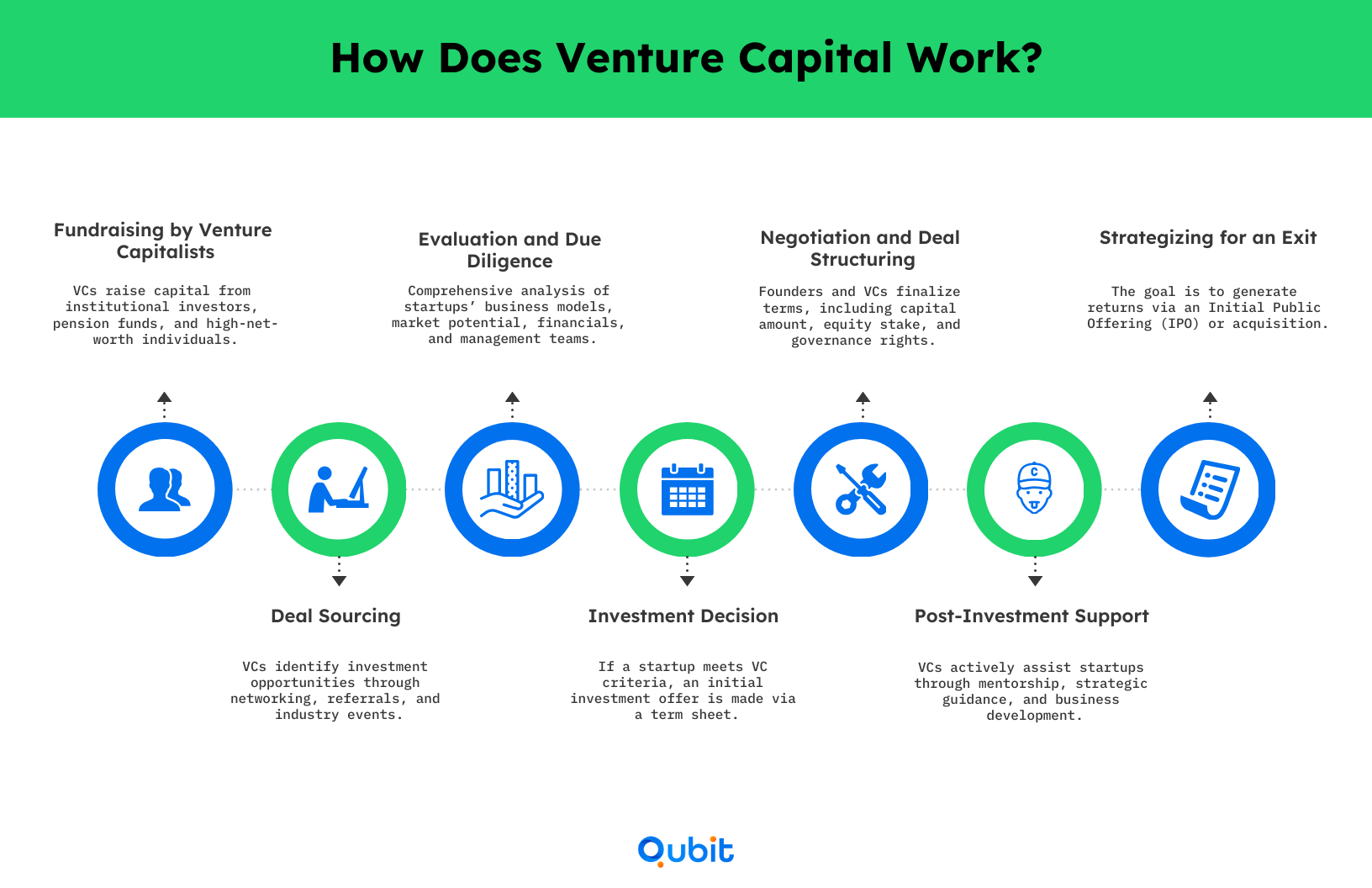As an entrepreneur with big ambitions, securing the right funding is paramount to scaling your startup. But what is venture capital, and how does it work?
This guide demystifies venture capital funding, breaking down complex concepts into practical insights. You'll learn how venture capital works, the benefits and drawbacks of seeking VC investment, and actionable strategies to secure funding for your startup.
We'll delve into advanced topics like investor psychology, ethical considerations, and how to tailor your approach to potential investors. By the end, you'll be equipped with the knowledge and tools to traverse the venture capital terrain.
A side note: Some startups explore early-stage options like Seed Funding Basics. These alternative methods provide the initial capital to get your idea off the ground, serving as a stepping stone toward larger investments.
How Venture Capital Works and Why It Matters
Venture capital is a form of private equity investment where investors provide funding to early-stage companies with high growth potential in exchange for equity stakes.
Unlike traditional financing, venture capitalists (VCs) are willing to embrace higher risk for the possibility of significant returns. This type of funding has been instrumental in turning visionary ideas into reality, fueling startups that reshape industries and transform how we live.
The Role of Venture Capitalists
Venture capitalists are investors or firms that manage venture capital funds. They seek out promising startups, offering not just capital but also strategic guidance, industry expertise, and valuable networks. Their involvement can accelerate your startup's growth, opening doors to new markets, partnerships, and customers.
How Does Venture Capital Work?

The venture capital funding process involves several key stages:
- Fundraising by Venture Capital Firms: VCs raise capital from institutional investors, high-net-worth individuals, and pension funds to create investment pools.
- Deal Sourcing: They actively search for investment opportunities through networking, industry events, and referrals.
- Evaluation and Due Diligence: VCs conduct thorough analyses of startups' business models, market potentials, management teams, and financial projections.
- Investment Decision: If a startup meets their criteria, VCs propose investment terms, often outlined in a term sheet.
- Negotiation and Deal Structuring: Both parties negotiate terms like the amount of capital, equity stake, and board representation.
- Post-Investment Support: VCs may take an active role in advising the startup, leveraging their experience and connections.
- Exit Strategy: The ultimate goal is to realize returns through an exit, such as an Initial Public Offering (IPO) or acquisition.
Why Venture Capital Matters for Startups
Understanding what venture capital is and how it works is fundamental for startups seeking rapid growth. With access to substantial capital and expert guidance, venture capital can push your startup to new heights.
However, first, you should weigh the benefits against potential drawbacks, which we'll explore later.
As you consider funding options, explore Types of Startup Funding to learn about different mechanisms suitable for your startup's stage and industry.
The Venture Capital Funding Cycle: A Step-by-Step Guide
Securing venture capital funding requires a strategic approach. The funding cycle consists of several stages, all essential to your success.
Step 1: Building Relationships and Networking
Establishing connections with potential investors is foundational. Attend industry conferences, pitch events, and networking sessions. Utilize platforms like LinkedIn and seek personal introductions to venture capitalists.
Step 2: Crafting a Compelling Pitch
Your pitch should succinctly convey your startup's vision, value proposition, and growth potential. Engage investors both intellectually and emotionally, highlighting what makes your startup unique.
Step 3: Undergoing Due Diligence
If investors express interest, they'll conduct due diligence to verify your claims. This process includes reviewing financial statements, customer data, intellectual property, and legal documentation. Transparency and organization build trust during this phase.
Step 4: Negotiating Terms
The term sheet outlines the investment's terms and conditions. Key elements include valuation, equity percentage, board seats, and exit provisions. Understanding standard practices and advocating for your interests are crucial during negotiation.
Step 5: Closing the Deal
Upon agreement, funds are transferred, and the investment is officially closed. This marks the beginning of a partnership where both parties work toward mutual success.
Step 6: Post-Investment Collaboration
VCs often take an active role in guiding your startup, providing mentorship, resources, and important introductions. Maintaining regular communication and aligning goals maximizes this collaboration.
Understanding investor psychology is key to crafting a compelling narrative and building strong relationships. Learn more in The Art of Storytelling for Startups.
Who Provides Venture Capital?
- Venture Capital Firms: Professional firms dedicated to investing in high-growth startups.
- Angel Investors: Affluent individuals investing personal funds, often in early stages.
- Institutional Investors: Entities like pension funds and insurance companies investing through VC firms.
- Corporate Venture Capital: Large corporations investing in startups aligned with their strategic interests.
- High-Net-Worth Individuals: Private investors seeking high-return opportunities.
For deeper fundraising tactics and the latest trends, explore Venture Capital Fundraising Strategies for 2024.
The Pros and Cons of Venture Capital Funding
While venture capital can be transformative, it's important to weigh its advantages against potential downsides. A balanced view helps you make informed decisions aligned with your startup's goals.
Benefits of Venture Capital
Access to Significant Capital
VC funding provides substantial financial resources. This enables you to scale operations, enter new markets, and speed up product development. All this, without the burden of loan repayments.
Expert Mentorship and Guidance
Venture capitalists offer industry knowledge and operational experience. Their guidance can help you navigate challenges, refine strategies, and avoid common pitfalls.
Valuable Networking Opportunities
Being part of a VC's portfolio connects you to a broader network of entrepreneurs, industry experts, and potential partners or customers.
Enhanced Credibility
Association with reputable investors can enhance your startup's credibility, making it easier to attract top talent, secure partnerships, and gain customer trust.
Drawbacks of Venture Capital
Equity Dilution
In exchange for capital, you'll give up a portion of ownership. This means sharing future profits and decision-making power.
Potential Loss of Control
VCs may require board seats or veto rights on key decisions, influencing your startup's direction.
Pressure for Rapid Growth
VCs aim for high returns within a specific timeframe, which can lead to aggressive growth strategies that may not align with your vision.
Misaligned Objectives
Differences in values or goals between founders and investors can create tension, affecting company culture and long-term success.
Ethical Considerations
Venture capital may impact your company's culture and ethical stance. For example, the pursuit of rapid growth may pressure you to compromise on quality, employee well-being, or social responsibilities. Ensure potential investors' values align with yours.
Example:
A tech company focused on sustainability, partnered with a VC firm prioritizing quick market domination over environmental impact. The resulting clash led to employee dissatisfaction and negative public perception, harming performance.
When discussing deal terms, being well-prepared helps you negotiate agreements that protect your interests. Reference Negotiating with Venture Capitalists for in-depth insights. Use what vcs look for in diligence to tighten how you present traction quality. It explains how to show cohort retention, payback windows, and contribution margin.
Actionable Strategies to Secure Venture Capital
Securing venture capital funding is not easy; there is stiff competition. Thorough preparation, strategic networking, and a compelling value proposition are key to standing out.
How Can a Startup Secure Venture Capital?
A startup can start by preparing a solid business plan. Then they must craft a compelling pitch and identify suitable investors to reach out to. Lastly, they should know how to navigate the due diligence process.
Preparing Your Startup
Develop a Comprehensive Business Plan
Articulate your vision, market opportunity, competitive landscape, revenue models, and growth strategies. Include realistic financial projections and key milestones.
Build a Strong Team
Showcase a team with the expertise and experience to execute your plan. Investors invest in people as much as ideas.
Conduct Market Research
Demonstrate deep understanding of your industry, target customers, and market trends. Highlight how your startup addresses unmet needs or gaps.
Protect Intellectual Property
Secure patents, trademarks, or copyrights to safeguard your innovations. Intellectual property is often a significant asset in attracting investors.
Crafting a Compelling Pitch
Tell a Captivating Story
Use storytelling to connect emotionally with investors. Share your startup's origin, mission, and the problem you're solving.
Highlight Unique Value Propositions
Clearly articulate what sets your product or service apart. Emphasize innovation and competitive advantages.
Use Data-Driven Insights
Support your claims with market data, customer testimonials, and performance metrics.
Demonstrate Traction
Show evidence of market validation, like user growth, revenue, partnerships, or pilot projects.
For specific attraction strategies, check out Tips to Attract Venture Capitalists.
Personalization Techniques
Research Potential Investors
Understand each investor's focus areas, portfolio companies, and investment preferences. Tailor your approach accordingly.
Align on Vision and Values
Highlight shared interests or goals to build rapport. If a VC invests in sustainable technologies, emphasize your startup's environmental impact.
Adapt Communication Styles
Be mindful of cultural differences and preferences. Some investors appreciate detailed analytics; others prefer high-level concepts.
Managing the Due Diligence Process
Prepare Thorough Documentation
Organize all necessary documents, including legal agreements, financial statements, customer contracts, and team resumes.
Maintain Transparency
Be open about risks, challenges, and areas needing improvement. Honest communication fosters trust.
Respond Promptly
Timely responses to information requests demonstrate professionalism and commitment.
Address Legal and Compliance Issues
Ensure regulatory requirements are met and potential legal hurdles are proactively managed.
Learn more in our guide on Venture Capital Due Diligence.
Case Studies of Venture-Backed Startups
Analyzing real-world examples offers valuable lessons on what drives success or leads to failure in the venture capital journey.
Success Story: Zoom Video Communications
Background: Founded in 2011, Zoom entered a crowded market but focused on delivering a user-friendly, reliable video conferencing solution.
Key Factors for Success:
- Product-Market Fit: Zoom identified pain points in existing solutions and delivered superior usability and performance.
- Adaptable Business Model: A freemium model encouraged widespread adoption, leading to organic growth and upselling opportunities.
- Strong Leadership: Founder Eric Yuan's experience and vision attracted investor confidence.
- Strategic Use of VC Funding: Capital was invested in infrastructure and customer acquisition.
Outcome: Zoom went public in 2019, achieving a significant market capitalization.
Lessons Learned:
- Focusing on customer experience differentiates you in a competitive market.
- Strategic fund allocation accelerates growth and valuation.
Failure Analysis: Theranos
Background: Theranos claimed to revolutionize blood testing with minimal samples.
Reasons for Failure:
- Misrepresentation: The company exaggerated capabilities, misleading investors and regulators.
- Lack of Transparency: Secretive practices hindered due diligence, hiding technological flaws.
- Absence of Validation: Lack of peer-reviewed research or independent verification raised concerns.
- Poor Governance: The board lacked technical expertise to challenge leadership.
Outcome: Theranos dissolved amid fraud charges.
Lessons Learned:
- Integrity and transparency are fundamental for long-term success.
- Robust due diligence protects investors and stakeholders.
Exclusive Insights
- Investor Relationships: Open communication and goal alignment enhance collaboration.
- Adaptability: Pivoting in response to market feedback can turn potential failures into successes.
- Ethical Practices: Upholding ethical standards fosters sustainable growth and a positive reputation.
Other Funding Options for Startups
While venture capital funding offers significant benefits, it's not the only route. Explore other alternatives and you may find the best fit for your startup's needs.
Alternative Funding Options
Angel Investors
High-net-worth individuals who invest personal capital, often providing mentorship and industry connections.
Crowdfunding
Platforms like Kickstarter or Indiegogo allow you to raise small amounts from many people, often in exchange for early access or equity.
Grants and Competitions
Non-dilutive funding from government agencies, foundations, or industry competitions provides capital without equity loss.
Bank Loans and Venture Debt
Debt financing options require repayment with interest but allow you to retain ownership.
Bootstrapping
Using personal savings or revenue generated from sales to fund growth, maintaining complete control over your company.
Explore Types of Startup Funding for a comprehensive overview of funding options.
The Impact on Venture Capital
Understanding how economic trends influence venture capital enables you to time your fundraising efforts and customize your approach.
Economic Analysis
Market Volatility
Economic downturns may cause VCs to be more cautious, prioritizing existing portfolio companies or favoring startups with proven revenue streams.
Interest Rates
Higher interest rates can reduce capital availability as investors seek lower-risk investments. Conversely, low rates may encourage venture investments.
Sector Shifts
Economic conditions could shift investor focus toward resilient or high-growth sectors, such as healthcare or cybersecurity during the COVID-19 pandemic.
Future Outlook
Focus on ESG (Environmental, Social, and Governance)
Investors increasingly prioritize startups with strong ESG practices, reflecting a societal shift toward sustainability.
Technological Innovation
Advancements in AI, biotech, and fintech present opportunities for startups leading in these areas.
Globalization and Emerging Markets
Venture capital is expanding into emerging markets, offering new opportunities globally.
The Next Steps
Understanding what venture capital is and how it works equips you to make strategic decisions for your startup's growth.
By preparing thoroughly, crafting compelling pitches, and building genuine relationships with investors, you position your startup for success in the competitive funding landscape.
For more on scaling your startup with venture capital, visit our guide on Scaling Your Startup with Venture Capital.
To fuel your startup's growth, Connect with Qubit Capital for personalized support and tailored funding solutions.
Key Takeaways
- Understanding Venture Capital Matters
Knowing what venture capital is and how it works is essential for startups seeking significant growth. - Preparation is Fundamental
A solid business plan, strong team, and clear value proposition attract investors. - Crafting Compelling Pitches is Crucial
Effective storytelling and data-driven presentations engage investors and differentiate your startup. - Weigh the Pros and Cons
Consider the benefits of capital and support against potential loss of control and equity dilution. - Explore All Funding Options
Venture capital is one of many funding avenues. Evaluate alternatives to find the best fit. - Stay Informed on Economic Trends
Understanding market dynamics helps you navigate the venture capital landscape strategically.
About Qubit Capital
At Qubit Capital, we're dedicated to supporting startups with insightful, practical, and comprehensive resources. Our commitment to innovation, education, and entrepreneurial growth sets us apart as a partner in your journey to success.
Our Services Include:
- Customized Funding Solutions
We connect startups with investors aligned with their vision and industry. - Strategic Advisory
Our team offers expert guidance on business strategy, market entry, and growth planning. - Investor Matchmaking
Using advanced AI tools, we match startups with suitable investors based on unique needs.
Learn more about our AI-driven approach to discover how we tailor matches based on your startup's characteristics.
Frequently asked Questions
What is venture capital and how does it work?
Venture capital is a form of private equity investment where investors fund startups with high growth potential in exchange for equity. It works by providing capital to early-stage companies to scale operations, expecting substantial returns once the company succeeds.






